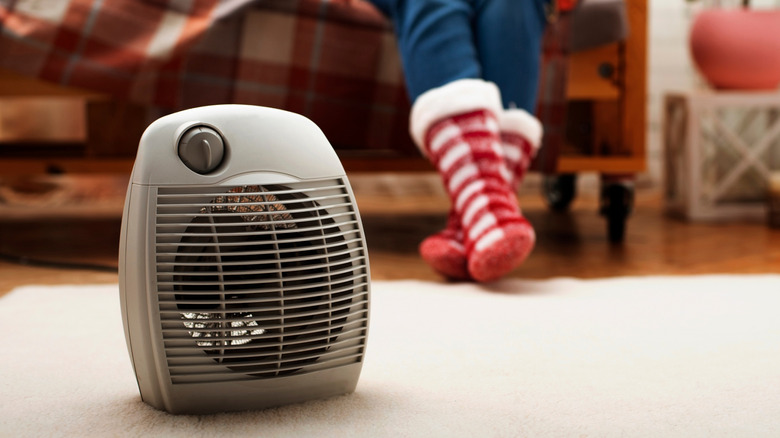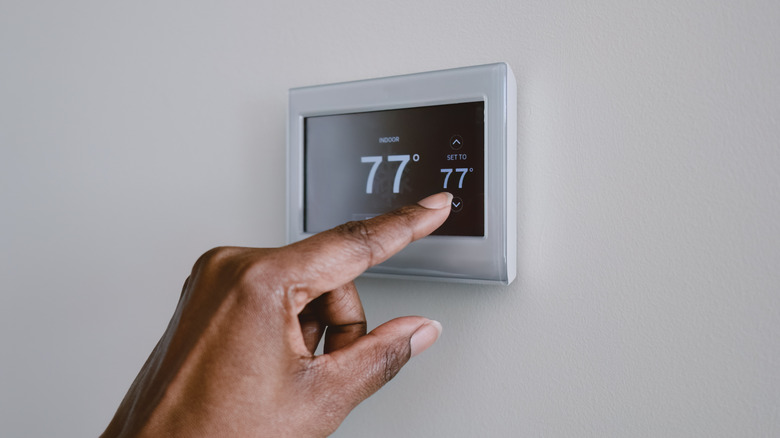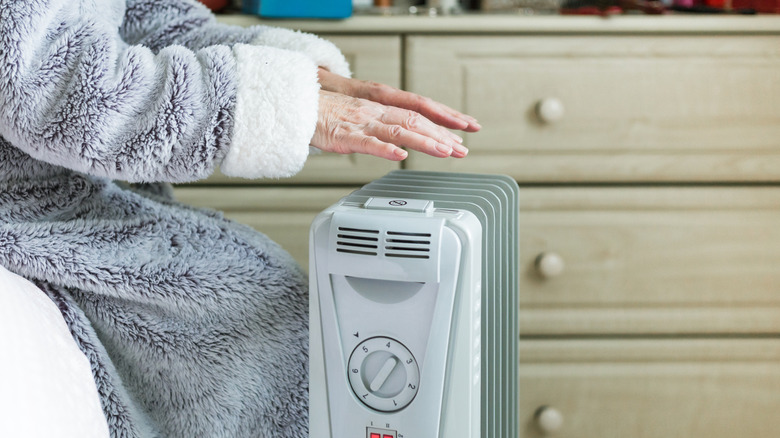Will Using A Space Heater To Warm Your Home In Winter Actually Save You Cash?
It's one of those questions that instantly turns the answerer into either a pedant or a Marx Brother. Will using a space heater save you money? Well, no, but using it instead of your central heat might. Using a fur coat or a winter home in Boca might also cost less than central heating, if we're going down that road. That said, the world has long been in search of a concise, useful explanation for whether space heaters or central heat will keep you cozy more cost-effectively. And the world might have found it in CNET Senior Editor David Watsky's earnest attempt to quantify exactly how much you can save by doing what all the experts tell you not to do: relying on a space heater to supplement or replace your whole-house heating system.
The answer? It turns out that you can save a lot. Maybe.
Watsky is diligent and thorough, but it's also pretty improbable that everyone else is wrong. So, we have a bit of a conundrum. Watsky's basic premise is that it's cheaper to heat a single room with a space heater than to heat an entire house with a whole-home central heating system. On one hand, this is essentially a truism. The only way this could possibly be wrong is if your space heater costs more to operate than your central heat. Since most electric space heaters are sized for standard 15-amp electric circuits, effectively capping them at 1500 watts of power, that's exceedingly unlikely. Even the smallest and most efficient heat pump will need 20 amps, and larger systems will need 60 amps or more. From there, now, let's look deeper.
Is this the right way to look at space heaters?
What Watsky is proposing is turning off your central heat for a portion of the day and running a space heater in a smaller area during that time. A space heater is cheaper to run than your furnace and all that HVAC jazz, so voila – instant savings of somewhere between $72 and $506 between October and March. So what if it's a truism to say that running a cheaper thing is less expensive than running an expensive thing? Truisms are, after all, true.
But truisms have a habit of not telling the whole story, and there are a few things missing from this one. First is the obvious point that you will be heating one room instead of the whole house. Of course it's cheaper to heat one room, but it's also colder in the other rooms. It's like saying a Smartcar will save money over driving a bus ... true, as far as it goes, but at some point, a third passenger is going to be standing at a bus stop, and you have to either add a new route or start bolting lawn chairs to the roof.
To put it simply, you're saving money because, well, you're not doing the same thing. Second, the savings might not be as much as you expect. Space heaters cost a lot more than central methods of room heating, while central heat (and especially heat pumps) work best when you leave the thermostat alone. One reason is that turning your heat off can then increase the cost of central heating once you turn it back on.
Turning your thermostat off isn't a good financial bet (and having a space heater running won't help)
The idea of lowering your thermostat setting for a period of time for energy (and therefore cost) savings is called a setback, and it works. However, dramatic setbacks (and especially turning your heat off altogether) can cause the system to use more energy than usual when trying to catch back up after you return to normal thermostat settings. This problem is exacerbated by inefficient heating systems or more poorly insulated homes, and heat pump efficiency can be reduced by setbacks as well. Yes, you will save energy by turning off or lowering your thermostat temporarily. But think of it this way: If your heat normally runs 50% of the time, while the system is recovering from a lowered thermostat (and therefore colder room), it will run 100% of the time for a while to catch up. This necessarily undermines some portion of your savings... which you're also cutting into with your space heater, of course.
So turning your thermostat down instead of turning it off might be best, knowing it won't save you as much on your power bill. You'll save more by using the space heater during peak hours, assuming you have electric central heat and it's priced that way. If you do this, please use a space heater with a thermostat control so that it doesn't overheat your room –- that's just more waste.
For this method, what room gets to have the cozy space heater?
Another good question is whether or not you can cope with heating only one room of your home. Watsky suggests using a space heater in an office or living room, but the use that probably makes the most sense is overnight in your bedroom(though running a space heater overnight isn't always the safest approach, for obvious reasons). You might leave your office for a cold living room that's been unheated for most of the day, and you might leave the living room for an unheated bedroom. But you are likely to leave the bedroom during warmer daytime hours, and you might leave your house altogether.
Also note that when you turn it back on, central heat will tend to overheat the room where a space heater was used, unless the thermostat is in that room, in which case it won't even kick on. So, while it makes sense to use a space heater in a small space that's closed to the rest of the home, when you turn the central thermostat back to its usual settings, you should open up the space-heated room so it can freely exchange air with the thermostatically controlled area. And if you're heating a bedroom with your space heater, open the door to your en suite bathroom. You might be able to make breakfast in a cold kitchen, but there are probably only so many times you're willing to use a frigid bathroom before you decide the money savings aren't worth it.
Not satisfied? Truthfully, the best way to use a space heater is to not need it at all, by taking all the right steps to making your home's rooms warmer. But that's a whole other can of worms.



